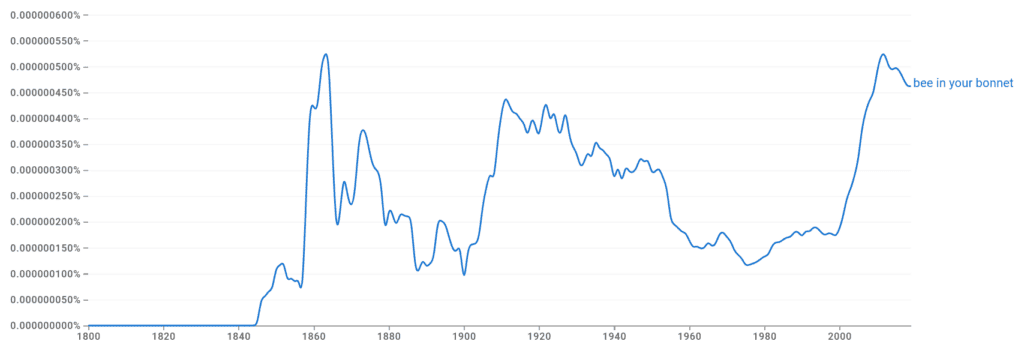A bee in your bonnet means you’ve got a particular idea or thought stuck in your head, and it’s so consuming that it’s practically all you can chatter about. Idioms, like this charming one, are the sprinkle of magic in the English language. They turn ordinary sentences into vibrant expressions, making our conversations colorful and memorable.
What’s an idiom, you ask? Well, it’s a phrase where the meaning isn’t directly deduced from the words themselves but from the popular usage of the phrase over time. They’re the little puzzles that make English both delightful and sometimes head-scratching.
If you’re keen to know more about how to weave “to have a bee in one’s bonnet” into your daily banter, you’re in the right place. Stay tuned, and I’ll unveil its backstory and provide some lively examples to get you buzzing with excitement.
Bee in Your Bonnet Idiom Meaning
Having a bee in one’s bonnet paints a vivid picture of an unrelenting idea or concern that keeps hovering in one’s mind, much like a persistent bee buzzing around a hat. It suggests that someone is so engrossed with a particular thought that they can’t resist mentioning it, often to the point of exasperation for those around them. Imagine the continuous humming of a bee trapped in a bonnet—distracting, isn’t it? That’s precisely what this idiom is getting at: a fixation that you just can’t shake off, especially when you feel the need to vocalize it over and over.
I tend to get a bee in my bonnet whenever I have a new book idea pop into my head. It becomes all I can think about for days and days until I can sit down to get it all out on paper. I can’t read, watch television, or anything else until I get the ideas out.
Bee in One’s Bonnet Origin and Etymology
The origins of “having a bee in one’s bonnet” take us on a time travel back to 16th-century Scotland. It’s a vivid idiom that, when visualized, can get anyone squirming—just imagine an agitated bee trapped in a hat, buzzing incessantly near your ears. Such a situation would certainly monopolize your attention, making you fidgety and singularly focused on that one distressing issue.
In fact, there’s evidence from historical literature that suggests this phrase might have come from a very similar sentiment. One notable mention is in Alexander Douglas’s Aeneis, penned in the 16th century, where he writes, “Quhat bern be thou in bed with heid full of beis?” When deciphered, this Scots phrase roughly translates to, “What matter troubles you to have a head full of bees?” This literary example might very well be the precursor to the idiom we’re familiar with today. It’s fascinating to see how such expressions evolve over time, adapting to cultures and tongues, yet retaining the core imagery that gives them life.
Synonyms for Bee in My Bonnet
Use any one of these simple alternatives for bees on your bonnet.
- Obsessed
- Fixated
- Preoccupied
- Single-minded
- Tunnel-visioned
Bee in Your Bonnet Examples in a Sentence
- Ever since my sister heard about climate change, she’s had a bee in her bonnet about recycling.
- John has a bee in his bonnet about the new dress code policy at work.
- Don’t mind her; she’s just got a bee in her bonnet about her upcoming move out of state.
- Wow. He’s got a real bee in his bonnet over the election results.
- I can’t focus; I’ve got this bee in my bonnet about my publishing project.
- My mom has a bee in her bonnet about me getting a job at fifteen, but I really want my own spending money.
- Why do you have such a bee in your bonnet over that comment she made?
- She’s got a bee in her bonnet about healthy eating lately.
- You’ve had a bee in your bonnet about this all day; let it go, for Pete’s sake!
- Ever since the meeting, she’s had a bee in her bonnet about team productivity, and it’s driving everyone in the office crazy.
Don’t Let It Sting: Embrace the Buzz
Remember, a bee in your bonnet isn’t a fashion statement. It’s just another way of saying you’re obsessed with a single idea or item. Idioms like a bee in one’s bonnet sweeten the pot of conversation, adding a dose of intrigue and depth. So go on, get that bee out of your bonnet, or better yet, put it to work for you, and check out my other grammar guides.
Enjoyed reading about this idiom? Check out some others we covered:



